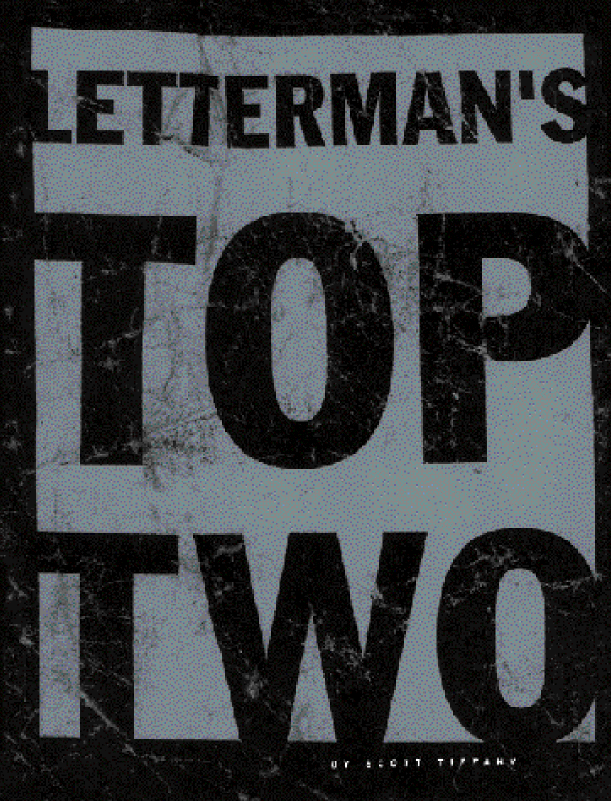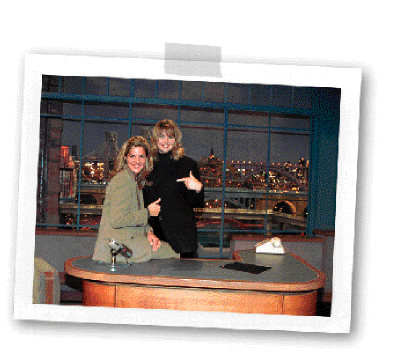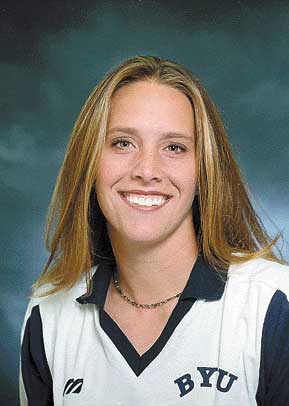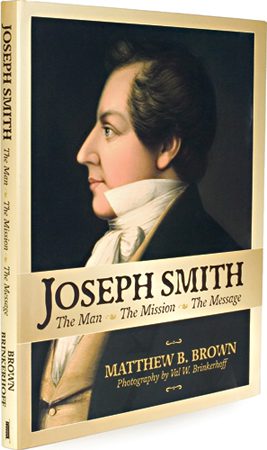For two BYU graduates, the first eight hours of the work day are just preparation. At 4 p.m., their work really gets started. The next 90 minutes in their New York office are frantic, precisely timed, and exhilarating. They are putting the final touches on a TV show for one of America’s most funny men, David Letterman.
At 4:20, they make sure Mr. Letterman is free to dress for the show. At 4:40, they see that Letterman meets with his writers for final script changes, and they verify that a copy is on set with cue cards ready. At 4:55, the show’s host grabs his football—a show tradition—and heads to the stage. At 5:20, the band starts playing in front of a live audience. At 5:28, Letterman walks on stage.
“Even if the day has been crazy and hectic,” says Heather Petersen, “when Dave walks on stage and the show begins, it’s always exciting—there’s always a little something.”
“There are days I still can’t believe I’m here,” says Lee Anne Archibald. “It’s still a reality check.”
Since graduating from BYU’s journalism program in April 1996, Heather and Lee Anne have worked as David Letterman’s personal assistants. They arrive at their Broadway office in the Ed Sullivan Theater between 8 and 8:30 every weekday morning. The show wraps about 6:30, but the duo doesn’t usually leave until 9:30 p.m.
Not to be outdone, Letterman leaves for work around 6:30 a.m. from his home in Connecticut, and arrives usually just before Lee Anne and Heather. He comes in early to beat traffic, but also because he is an incredibly committed show host, says Heather. “He has his hands in everything from the moment he gets here,” she says. “He’s meeting with the writers, he’s meeting with the segment producers, he’s down at rehearsal. He knows everything about the show.”
But Heather and Lee Anne aren’t far behind. Other than Laurie Diamond, Letterman’s friend and executive assistant for 13 years, the BYU graduates work with the host more intimately than anyone. They are involved with nearly every aspect of the show and handle every request made of Letterman’s time, from charity banquets to media interviews. “We deal with everything from contracts with his attorneys for his appearances on different TV stations and interviews down to making sure his car is running,” says Heather. Incidentally, Letterman, an avid car fan and collector, drives a 1993 Dodge Stealth.
Lee Anne and Heather met while preparing to work as interns in New York as part of the communications program during the summer of 1995. Lee Anne, from Tempe, Ariz., interned with Reader’s Digest, and Heather, from Las Vegas, worked as an intern for the Late Show—although not without a struggle.
Heather’s internship experience got off to a rocky start when, two months before she arrived, the women’s magazine she was supposed to work for was sold. Her internship was canceled, but Heather was undaunted and applied with 1,000 other applicants for the Letterman internship. She was offered the job a week later.
“The experience I had as an intern was amazing because it prepared me for this job,” Heather says. Since her experience as Letterman’s first BYU intern, the Late Show has hired three more BYU student interns, none of whom Heather or Lee Anne “pushed through.”
“The Utah connection is catching on with our staff,” says Diamond, Heather and Lee Anne’s direct supervisor. “The guest relations division of the Late Show is now seeking BYU graduates based on their experience with my terrific staff.”
A few months after her internship, Heather returned to Manhattan to do Letterman’s Christmas shopping. In early 1996, one of the full-time assistants took a job with Rosie O’Donnell, and the vacant spot was offered to Heather. Although she was hired one month before graduating, the Late Show waited patiently for Heather to finish.
About the same time Heather started her new job, Lee Anne, an avid sports fan, took a job in Bristol, Conn., working with ESPN. Although the graphics department wasn’t exactly her “thing,” she was happy at the channel. But only a few weeks later, Lee Anne and Heather were having a casual conversation on the telephone. Heather mentioned that the other assistant had left. “Then it kind of turned into, ‘Well, would I be interested?'” Lee Anne says.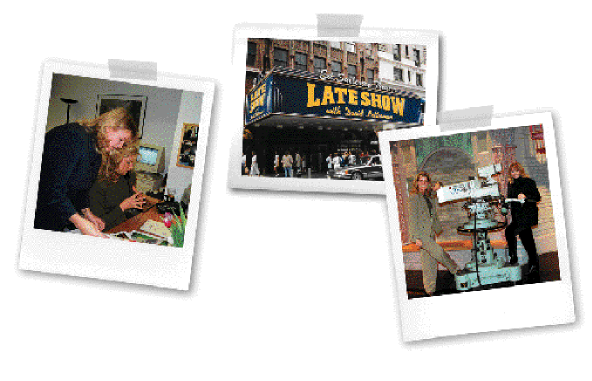
Lee Anne didn’t feel particularly qualified. In fact, she was the only candidate who had not previously interned at the Late Show. “I didn’t know if that would work against me or for me,” she says. Apparently it worked for her.
She went to New York and interviewed on a Thursday, spending a few hours talking with everyone except Letterman. “When I left, I thought, ‘I really want this.’ I’d never had that feeling before,” she recalls. “I wanted it really, really bad.”
Laurie Diamond called Monday to offer Lee Anne the position. By Thursday, a week from the day she interviewed, Lee Anne had changed jobs, cities, and careers. “This is a great place to be at this stage in my life,” Lee Anne says. “I can’t imagine doing the show without Heather. It would be a completely different experience without her.”
To say the least. The two lived in the same building while they were interns in 1995 and have been roommates since Lee Anne’s full-time arrival in New York. “We’re very much on each other’s sides,” says Lee Anne. “We’re never going to stab each other in the back, and it’s nice to know, especially in this business, that we’re there for each other.”
Heather and Lee Anne have also found that the man behind the celebrity image is also there for them. Letterman has always been very polite and courteous, says Heather. “You remember every time he says hi to you in the beginning, every little moment.” In one of those early moments during her internship, she recalls sitting in Letterman’s car. “I thought, ‘Oh my gosh, I’m driving his car.’ I think I used the cell phone to call someone, and I said, ‘You’ll never guess whose car I’m in.'”
Lee Anne says it understandably takes Letterman a while to trust people. But Heather and Lee Anne have worked hard to gain that trust, and their relationships have evolved into enduring friendships.
“I was very standoffish, but now it’s just much more comfortable, more trusting,” says Lee Anne.
“He knows more about our personal lives now,” says Heather. “He feels more comfortable. He’s much more relaxed and humorous.”
But from 4 o’clock when show production kicks into high gear until the taping ends around 6:30 p.m., everything runs like strict clockwork. “He is very focused on the show; he’s not Mr. Funny Man all the time,” Heather says. “Fridays are great days because we don’t have a show and he’s very relaxed. Of all the days he’s like the Dave on TV, it’s Fridays.”
Letterman began his television career in his hometown of Indianapolis—where he worked various jobs including a stint as a weatherman—before he got his start as a host by guest-hosting Johnny Carson’s show on NBC. After several years of hosting his own show—with such well-known trademarks as the Top Ten and Stupid Pet Tricks—Letterman was thought to be a likely candidate for Carson’s replacement when he retired in 1992, but Letterman kept his show and made a widely publicized switch of home stations to CBS in 1993.
Now in his 16th year of late-night TV, Letterman doesn’t spend much effort trying to beat Carson’s replacement, Jay Leno. “When it comes to ratings, Dave doesn’t want to hear about it,” Heather explains. “We want to put on a good show. We want to have a good time. We want to focus on the show.”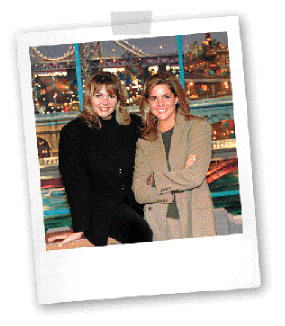
And, says Heather, Letterman is focused on the Late Show; it really is his life. “Before he goes on, he says, ‘Unless my house is burning down, don’t tell me anything.'”
Being thrust into such a high-profile atmosphere has provided its share of memorable experiences for the BYU alumnae.
As an intern Heather often drove Letterman’s car to the front of the Ed Sullivan Theater after the show so he could immediately whisk away home. She describes her old routine: “I park in front of the marquee. He leaves the office, they call, I pull the car around, he comes down, and he gets in.”
But one of the first times was not as smooth. Still nervous about driving the celebrity’s Stealth, Heather got the car and was waiting for the standard phone call. But when the call came, she was stunned. “I was so unfamiliar with car phones, I yanked the whole entire thing out of its socket. I mean cords and all, just hanging there. What do you do?”
She frantically tried to put the phone and cords back together but to no avail. Meanwhile, the host’s former assistant was standing on the corner screaming at Heather to pull the car around before Letterman was mobbed by crowds. When he got in, all she could do was look at him sheepishly and humbly apologize.
Lee Anne has her own telephone war stories.
A few months into her new job, she had a memorable phone conversation with Mr. Michael Ovitz, the multimillionaire and entertainment giant who was once Letterman’s agent and later president of the Walt Disney Company. One of the most influential people in Hollywood, he was vacationing on a yacht in some distant sea.
“I guess people don’t call him Mike. They call him Michael or Mr. Ovitz.” One can guess the rest of the story. “My first time on the phone with him, I think I called him Mike about three times: ‘Yeah, O.K., Mike.’ Really casual.”
After Lee Anne hung up, an incredulous Heather hesitantly asked if that was Michael Ovitz. Not much more needed to be said. Heather simply said slowly, “We don’t call him Mike.”
Recently, an associate said to Lee Anne, “You’ve been in New York for a year. Are you still Mormon?”
“I think she thought that when we first came out from Utah we were protected and that after we had been around for awhile, we might loosen up,” Lee Anne says. “I told her we haven’t. We’re religious girls, and we won’t change. She was very impressed about that.”
“We haven’t had to compromise anything,” Heather adds. “We’ve never had to do something we didn’t want to. People are very understanding.”
For some of the people they work with, Lee Anne and Heather are “the only Mormons they’ve ever met,” Lee Anne says. “There are a lot of misconceptions. People aren’t familiar with our religion.” Socially, it was a little awkward at first as they were often asked about alcohol. “We’re the ones at the bar who are never drinking,” Heather says. “But I can work a Diet Coke for quite a few hours.”
People also ask questions about their habits, or lack thereof. “People ask about genealogy,” Heather says. “We’re known as ‘the Utah Mormon Girls.’ People wonder why we’re so happy.”
Letterman’s staff also calls them simply “the Mormon Girls,” “the Blonde Mormons,” or “the Flight Attendants,” because they are typically bubbly and cheerful. “They’re two beautiful blondes,” says Late Show producer Barbara Gaines, who has worked for Letterman since he hosted his first morning show in 1980. “They have both remained cheerful, genuine, and kind while keeping pace with their high-stress jobs.”
“These young women are the epitome of cool,” says Chris Schukei, the assistant for Letterman’s sidekick, Paul Shaffer. “They are forced to be experts on absolutely all subjects and they pull it off without breaking a sweat. In a typical hour they will deal with overnight ratings, videotape editing problems, and proper ways to word jokes, then they will be asked for current information about auto racing, popular music, and New York’s best restaurants. America puts a lot on Dave’s shoulders each night, but he is blessed with having the best ‘right hands’ in the business.”
“We just enjoy what we do,” Lee Anne says. “But people wonder, and they can’t figure out why we’re always upbeat.” She believes that many members of the Church are that way. “A lot of the things that people here associate with as being Lee Anne and Heather things are really about being in the Church. They are a part of our culture.”
Letterman has been able to learn, and perhaps appreciate, more about that culture himself. For Christmas 1996, Lee Anne and Heather gave him a copy of his genealogy. When he received it, the three had a memorable discussion in which Lee Anne and Heather were able to convey some of their personal religious feelings and beliefs, including some early history of the LDS Church.
Letterman is also a compassionate friend, says Lee Anne. In May 1997 her father, Lynn Archibald, a former basketball coach at the University of Utah, Arizona State, and BYU, died of cancer.
“When he passed away, everyone here at the Late Show, especially Laurie and Dave, could not have been more accommodating,” Lee Anne says. Laurie, Letterman’s executive assistant, lost her mother two years ago. Letterman’s own father passed away when he was young. During March, April, and May of 1997, Lee Anne took every Friday off from work and went home for the weekends.
A few weeks before her father died, Lee Anne was at work on a Wednesday just after four o’clock when her mother called. “We were getting ready for the show during the most hectic time of the day. My mom told me my dad was really sick.”
Lee Anne was shaken by the news and took a moment alone in her office. “Dave told me to go, that if I didn’t go I would regret it, and that not going was the only mistake there was to make,” she says. “It sounds so trivial, but because it was during that time of the day, it means much more to me. He was getting ready to go down for the show, and he was worried about me getting on a plane.”
That’s what she did. Letterman hadn’t even finished taping the night’s show before Lee Anne was flying home.
On another trip home, Lee Anne’s father passed away. While she stayed home for three weeks for the funeral and to be with her family, Letterman called to check how everyone was doing. “I think of how it could have been, worrying about needing to get back at work. But I’ve never felt guilty about not being at work during that time. I have no regrets, and I never felt torn.
“I gained a tremendous amount of personal loyalty to Dave through that time. He’s such a humble person and softspoken about things like that. He would never take credit—never take credit for anything. But he is a tremendous person. I learned a lot of that personally.”
The experience Lee Anne and Heather have had together has created a dynamic between them that is noticed by others and felt deeply by one another. “We can look across the room, and in one glance the other person knows what has to get done,” says Lee Anne. “She’s got my back. She’ll help me. She knows Lee Anne, and I know Heather.”
They are like sisters, and for Lee Anne, having a “family” member close by during her father’s illness meant stability and direction.
“It was quite an emotional time and quite bonding,” Heather says. “The whole staff kind of rallied around our department.”
“It’s nice to work with someone you know cares about you,” Lee Anne says. “To have someone who lets you break down in the office and who knows what you believe. Heather knows how much I love my dad and my family and that we’re going to be together forever. She’s that person all tied up in one, and then she can make me laugh and bring me out of it.”
Letterman, too, senses that bond. “Lee Anne and Heather are smart, energetic, and lovely,” he says about his BYU team. “We’re lucky to have them.”
Besides “the Flight Attendants,” there is another name Letterman and his staff have affectionately dubbed the duo, and it is one they call themselves. It’s a name that implies the dependability, creativity, trust, and commitment in their relationship with the Late Show host. Heather speaks volumes about their friendship with each other and with Letterman when she says, smiling, “We’re ‘the Girls.'”
A 1995 BYU graduate, Scott Tiffany is a freelance writer of film and video scripts. He and his wife, Mariah, live in New York City.







